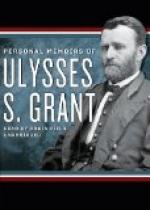The first dispatch I received from the government after the fall of Vicksburg was in these words:
“I fear your paroling the prisoners at Vicksburg, without actual delivery to a proper agent as required by the seventh article of the cartel, may be construed into an absolute release, and that the men will immediately be placed in the ranks of the enemy. Such has been the case elsewhere. If these prisoners have not been allowed to depart, you will detain them until further orders.”
Halleck did not know that they had already been delivered into the hands of Major Watts, Confederate commissioner for the exchange of prisoners.
At Vicksburg 31,600 prisoners were surrendered, together with 172 cannon about 60,000 muskets and a large amount of ammunition. The small-arms of the enemy were far superior to the bulk of ours. Up to this time our troops at the West had been limited to the old United States flint-lock muskets changed into percussion, or the Belgian musket imported early in the war—almost as dangerous to the person firing it as to the one aimed at—and a few new and improved arms. These were of many different calibers, a fact that caused much trouble in distributing ammunition during an engagement. The enemy had generally new arms which had run the blockade and were of uniform caliber. After the surrender I authorized all colonels whose regiments were armed with inferior muskets, to place them in the stack of captured arms and replace them with the latter. A large number of arms turned in to the Ordnance Department as captured, were thus arms that had really been used by the Union army in the capture of Vicksburg.
In this narrative I have not made the mention I should like of officers, dead and alive, whose services entitle them to special mention. Neither have I made that mention of the navy which its services deserve. Suffice it to say, the close of the siege of Vicksburg found us with an army unsurpassed, in proportion to its numbers, taken as a whole of officers and men. A military education was acquired which no other school could have given. Men who thought a company was quite enough for them to command properly at the beginning, would have made good regimental or brigade commanders; most of the brigade commanders were equal to the command of a division, and one, Ransom, would have been equal to the command of a corps at least. Logan and Crocker ended the campaign fitted to command independent armies.
General F. P. Blair joined me at Milliken’s Bend a full-fledged general, without having served in a lower grade. He commanded a division in the campaign. I had known Blair in Missouri, where I had voted against him in 1858 when he ran for Congress. I knew him as a frank, positive and generous man, true to his friends even to a fault, but always a leader. I dreaded his coming; I knew from experience that it was more difficult to command two generals desiring to be leaders than it was to command one army officered intelligently and with subordination. It affords me the greatest pleasure to record now my agreeable disappointment in respect to his character. There was no man braver than he, nor was there any who obeyed all orders of his superior in rank with more unquestioning alacrity. He was one man as a soldier, another as a politician.




